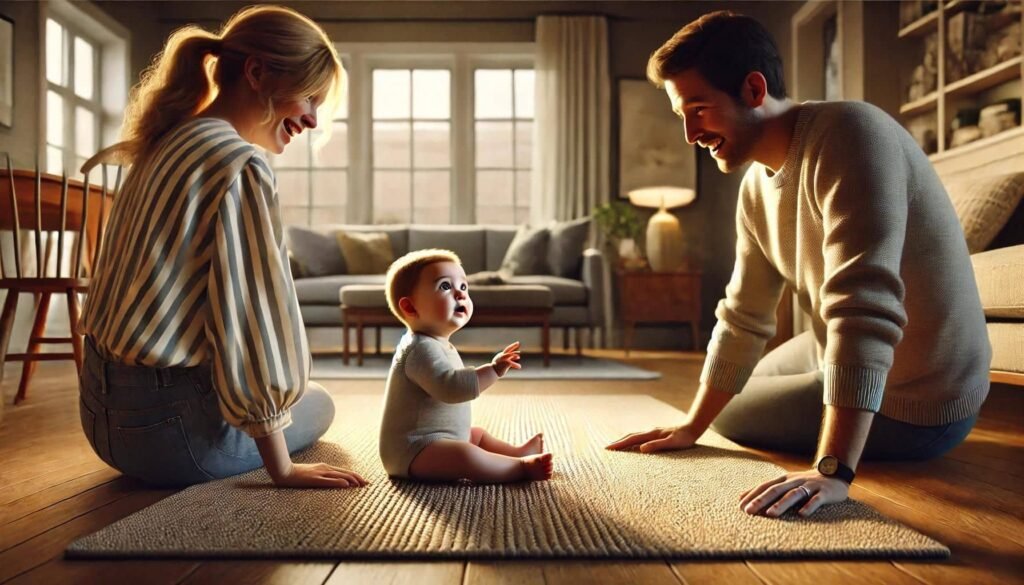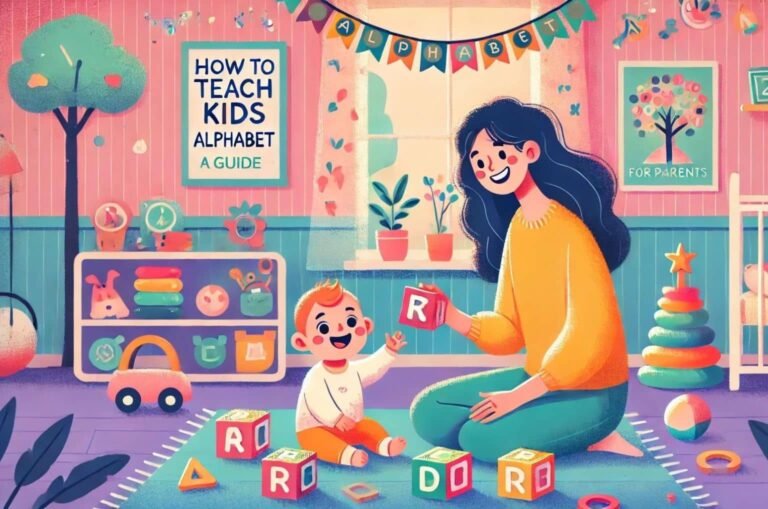Your baby’s first word is a big milestone that fills any parent with pride and joy. But have you ever considered which word should be the very first that your baby learns?

The Importance of Baby’s First Word
Your baby’s first word is more than just a linguistic achievement; it marks the beginning of their ability to communicate intentionally. This achievement opens up a new channel for interaction with their environment, providing them with a tool to express needs, desires, and feelings.
The word itself, and the context in which it is used, can shape early cognitive development, influence emotional connections, and set the stage for future learning.
While there’s no definitive answer as to what the first word should be, several considerations can guide this choice, ensuring that the word not only promotes healthy development, but also strengthens the bond between parent and child.
Common First Words and Their Impact
Traditionally, many babies’ first words are “mama” or “dada.” These are easy to pronounce and naturally come from the baby’s constant interaction with their parents.
Helping your baby to connect specific sounds with the people in their life who provide comfort, care, and love is a natural way to develop their communication skills verbally. And these words are often repeated by parents, which helps solidify the connection in the baby’s brain.
Words like “mama” and “dada” also have a significant emotional impact. When a baby says “mama” for the first time, it often leads to an emotional response from the mother, which can further encourage the baby to continue using and refining the word. This emotional feedback loop is crucial for early social and emotional development.

Should the First Word Have Practical Use?
While “mama” and “dada” are popular choices it could be suggested that a baby’s first word should be more practical, such as “milk,” “more,” or “up.”
These words serve a direct purpose, allowing your baby to express a specific need or request, which can be immediately fulfilled.
The immediate reinforcement that comes from using such practical words can be highly rewarding for your baby, encouraging further communication and helping them learn the value of language as a tool for achieving desired outcomes.
The Case for a Meaningful First Word
Some parents prefer their child’s first word to be something with deeper meaning or cultural significance.
For example, in bilingual households, the first word might be chosen from the language less frequently spoken at home to help the child develop their abilities in both languages from an early age.
Similarly, parents might choose a word that reflects their values or beliefs, such as “love” or “peace,” to instill these concepts early in their child’s life.
Considering Your Baby’s Perspective
From the baby’s point of view, the first word should be something that is easy to pronounce and relevant to their daily life.
It should be a word they hear often and associate with something positive.
Babies are naturally drawn to the things that bring them comfort, happiness, or excitement, so the first word should ideally connect to one of these elements.

The Power of Observation and Imitation
Long before they utter their first words, babies are absorbing sounds, tones, and rhythms from their environment that will form the foundation of their language skills.
A key technique through which babies learn to speak is by observing and imitating their parents. This method of learning—where babies mimic what they see and hear—is fundamental to their understanding of language and their ability to communicate.
By watching how their parents move their lips, make facial expressions, and use gestures, babies begin to connect these visual cues with the sounds and words they hear.
As parents, understanding the power of observation and imitation can help in fostering a baby’s language development.
By engaging with your child, responding to their attempts at communication, and providing a rich and varied language environment, you can support this incredible journey towards their first word.
Conclusion: What Should the First Word Be?
Baby’s first word is deeply personal and varies from family to family. Whether it’s “mama,” “dada,” or something entirely different, the first word will likely come from the child’s environment, shaped by the interactions and experiences that fill their early days.
What matters most is that this word helps the baby make connections—both linguistically and emotionally—with the people and world around them.
The significance of the first word goes beyond the word itself. It’s about the relationships it fosters, the skills it develops, and the doors it opens to a lifetime of communication and learning.
So, while there may not be a “perfect” first word, the best choice is one that resonates with both the baby and their family, reflecting the unique bond they share.
We are currently developing a list of recommended first words for babies.
Click here to be notified once this resource becomes available.
